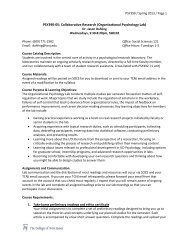MACHIAVellIAnIsM, UnetHICAl BeHAVIoR, AnD Well-BeIng In ...
MACHIAVellIAnIsM, UnetHICAl BeHAVIoR, AnD Well-BeIng In ...
MACHIAVellIAnIsM, UnetHICAl BeHAVIoR, AnD Well-BeIng In ...
Create successful ePaper yourself
Turn your PDF publications into a flip-book with our unique Google optimized e-Paper software.
184 DAHLING, KUyUMCU, AND LIBRIzzI<br />
from Machiavelli’s writing. First, they adopt a cynical view of the world and other people, expecting<br />
that each person is invested solely in his or her own self-interests. Second, they are willing to<br />
utilize manipulative tactics to influence others and secure desired outcomes. Third, they are quite<br />
willing to depart from ethical standards when unethical behavior provides a necessary advantage<br />
over others. To this end, Machiavellianism entails a freedom from ethical consideration rather<br />
than a propensity to always behave unethically. More recent research on Machiavellianism has<br />
elaborated on these ideas, pointing out that Machiavellian people behave this way predominantly<br />
out of a motivation to secure extrinsic achievements, rewards, status, and power over other people<br />
(Dahling, Whitaker, and Levy, 2009; McHoskey, 1999; Stewart and Stewart, 2006).<br />
Consistent with this research, Machiavellianism is best considered a stable motivational orientation,<br />
and it is important to clarify what Machiavellianism does not involve before proceeding<br />
further. First, Machiavellianism implies only a desire to manipulate, not necessarily a particular<br />
ability to exercise manipulative tactics effectively. Machiavellianism is distinct from traits like<br />
emotional intelligence, cognitive ability, and social skills (e.g., Austin et al., 2007; Dahling,<br />
Whitaker, and Levy, 2009; Jones and Paulhus, 2009) that facilitate effective manipulation, so it<br />
is important to recognize that Machiavellians are motivated to manipulate, but may not be skilled<br />
at manipulation by default. Second, Machiavellianism is related to, but distinct from, psychological<br />
disorders such as clinical psychopathy and narcissism (e.g., Paulhus and Williams, 2002).<br />
Machiavellian behavior is consequently present in the population of everyday working adults<br />
and is, unfortunately, a common experience in many organizations, which may have important<br />
consequences for employees’ well-being.<br />
<strong>MACHIAVellIAnIsM</strong> <strong>AnD</strong> <strong>UnetHICAl</strong> WoRkPlACe <strong>BeHAVIoR</strong>s<br />
Given their propensity to behave amorally and manipulate others, it is not surprising that Machiavellian<br />
employees commit a wide variety of unethical, counterproductive behaviors at work<br />
(e.g., Granitz, 2003; Gunnthorsdottir, McCabe, and Smith, 2002; Hegarty and Sims, 1979; Tang<br />
and Chen, 2007). Machiavellians will go to great lengths to get ahead of others, and likewise,<br />
they readily engage in interpersonal deviance to achieve these ends. For example, O’Fallon and<br />
Butterfield (2005) reviewed the empirical literature on ethical decision-making from 1996 to<br />
2003 and found that Machiavellianism was consistently and negatively linked to ethical decision<br />
making, a trend reflected in large bodies of research on stealing, lying, sabotage, and cheating<br />
committed by Machiavellian employees.<br />
theft<br />
Research illustrates that Machiavellians are readily willing to steal, even within trusting relationships.<br />
Harrell and Hartnagel (1976) found, for example, that Machiavellians stole from both<br />
trusting and distrustful employers. Their study allowed both high- and low-Machiavellians to<br />
steal in simulated worker–supervisor situations. <strong>In</strong> one condition, the confederate supervisor was<br />
blatantly untrusting of the participant worker and would regularly monitor his or her behavior.<br />
<strong>In</strong> another condition, the confederate supervisor was trustful of the worker and disclosed that he<br />
or she would not be monitoring the worker’s behavior. Most of the participants stole from the<br />
untrusting supervisor, but only the highly Machiavellian participants were more likely to steal<br />
from the trusting supervisor. Moreover, they also stole in greater quantities across both conditions<br />
when compared to participants with low Machiavellianism. Highly Machiavellian participants<br />
also tried to hide their theft and even denied it when interrogated by the distrustful supervisor. <strong>In</strong>








